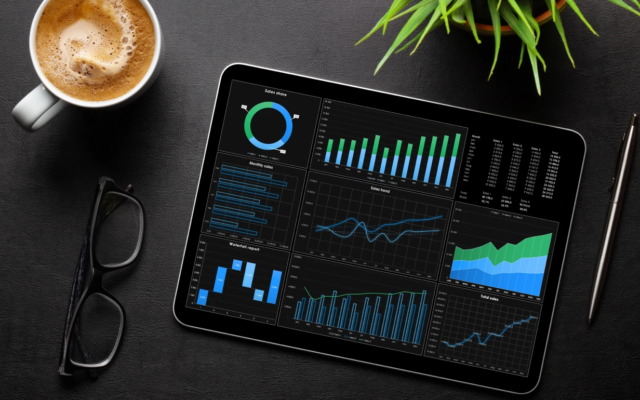Data is vital if a company wants to conquer a market, as it forms the basis of understanding the market and its needs. Data is so valuable that how you approach it influences your efficiency and profitability.
But today, markets are so large, and customers are so diverse that companies must deal with tons of information. That’s why businesses face the dilemma of analyzing data that bombards them from all sides.
Another challenge that arises sooner or later is how to become a multinational company. Moving to other countries is an uphill battle, especially if you know little about a new market. In this case, data helps understand the target audience’s needs.
So, now you’re aware that you can’t expand your business without relevant data. But how can you effortlessly collect and analyze data, interpret the market, and get insights for a win-win data management strategy?
Adopting enterprise analytics tools is a good strategy if you want to visualize the future of your business in a certain market. With analytics platforms in hand, you’ll be equipped with instruments responsible for market research and information about the current situation.
In this article, Forbytes will explain the meaning of enterprise analytics, reveal how you will benefit from it, and assist you in choosing the most relevant software for your business. Hopefully, this information will lead you in the right direction.
What Is Enterprise Analytics?
Before diving into the benefits of enterprise data analytics, let’s first focus on its meaning. Enterprise analytics is a process of gathering, analyzing, and processing large amounts of data to speed up decision-making. It uses various techniques like data discovery, data mining, predictive modeling, correlations, graph analysis, and data visualization to provide insights and context, predict future scenarios, and help make informed decisions.
For example, enterprise data analytics can help big companies spot gaps in understanding customer needs and identify new trends. Since large organizations handle bigger data sets, enterprise analytics focuses on simplifying them and turning them into actionable insights.
Today, the number of enterprise analytics solutions can be daunting. To make sense of it all, it’s necessary to start by understanding the following four types of data analytics:
- Descriptive analytics: Descriptive analytics looks at past data to show what happened and helps businesses understand their performance. It uses graphs, charts, reports, and dashboards to provide context. For example, in e-commerce, descriptive data analytics can give real-time stats like sales, revenues, and client details.
- Diagnostic analytics: Diagnostic analytics goes beyond describing data to explain why something happened. It’s also known as root cause analysis and uses techniques like data discovery, data mining, and drilling down. For example, in e-commerce, it can find patterns to identify issues causing a decrease in sales.
- Predictive analytics: Predictive analytics uses historical data and machine learning techniques to forecast future events. In retailing, it can predict a customer profile by analyzing sales.
- Prescriptive analytics: Prescriptive analytics builds on predictive data to recommend actions. It suggests what you should do next and the potential outcomes. For instance, if an online store predicts a decrease in sales, prescriptive analytics might recommend improving product strategy to attract more customers.
Reach out to the Forbytes team to unlock the full potential of your data with enterprise analytics.
How Enterprise Data Analytics Can Boost Your Business
Today, the global big data analytics market is worth $69.5 billion and is expected to reach $302 billion by 2030, growing at a 28.7% annual rate, and it shows no signs of slowing down. This means that more and more companies view data analytics as a powerful tool for increasing efficiency. Three out of five organizations are using data analytics to drive business innovation. But how can you benefit from enterprise data analytics?
More strategic data-driven decisions
Gone are the days when companies relied on intuition and feelings to make strategic business decisions as now organizations base their choices on trends and evidence derived from their data. By analyzing historical data and customer preferences, they can make more data-driven decisions.
Enterprise analytics can help predict sales and income. As a result, you can make more informed decisions about whether to invest in certain projects. For example, organic search data might indicate a high demand for a new product.
Better understanding of clients’ needs
Enterprise data analytics helps you understand your customers’ behavior, interests, preferences, and demographics in depth. As a result, you can use this information to create targeted marketing campaigns.
For example, if your data analytics shows that your target audience is younger than expected, this knowledge encourages you to focus on relevant marketing channels. Plus, with data analytics, it’s easier to tailor your marketing to deliver personalized experiences. So, you’ll get more loyal and happier clients and higher sales.
Operational efficiency
With data analytics, you’ll achieve more efficient operations as it helps detect bottlenecks and areas that need optimization. As a result, you can shift from manual and time-consuming tasks to automated and efficient systems.
Organizations can flourish by embracing predictive forecasting, resource optimization, and automation strategies. And in doing so, they can reduce costs, improve productivity, and strengthen competitiveness.
Real-time insights
Today, companies can’t stand still and need transformations that are possible with real-time insights. Data analytics tools can make actionable insights more accessible to businesses. They allow companies to monitor key performance indicators in real time, encouraging immediate adjustments.
Whether you’re tracking inventory levels or social media engagement, real-time data helps you stay responsive and agile in a dynamic business environment. As a result, you’ll become more competitive.
What Enterprise Analytics Tools Features Actually Make a Difference
Forbes presented the top 10 of the best data analytics software for different purposes. For instance, Microsoft Power BI was ranked as a top tool for data visualization, while Tableau was recognized as the best for business intelligence. Google Analytics and SAP Analytics Cloud are also on this list as tools valuable for enterprise performance.
Now, here’s a question: how to choose the best enterprise analytics tool for your business in a market overwhelmed with various options? The answer is pretty simple: consider the following features to ensure you are selecting the best platform for your needs:
- Data integration and management: Evaluate a tool’s capability to integrate and manage data from different sources, such as support for databases, cloud-based applications, and spreadsheets. Plus, ensure that the platform allows you to clean and transform data.
- Self-service analysis and reporting: Choose a data analytics platform with robust self-service features for business users, not just data teams. Focus on tools with interactive data visualization, natural language processing, and real-time cloud data connections.
- Security and compliance: Opt for enterprise analytics platforms with access controls for authorized data access and encryption to protect data at rest and in transit. Ensure the platform complies with regulations such as GDPR or HIPAA.
- Scalability and flexibility: Choose a platform that can scale with your business, handle large datasets, and support both cloud-based and on-premise deployments. Integration with other tools ensures flexibility and ease of use.
- Data accuracy and reliability: A trusted analytics platform delivers accurate insights from high-quality data. Opt for platforms with robust data integration, cleansing tools, and validation mechanisms to ensure data accuracy and consistency across reports.
- Advanced analytics capabilities: Look for platforms with advanced analytics such as predictive modeling, machine learning, and AI data analytics. This helps uncover hidden patterns, predict trends, and automate decisions, driving innovation and competitive advantage.
Contact our team to learn how Forbytes’ data experts can provide you with the analytical tools to start using data analytics in your business today.
What to Consider When Implementing Enterprise Analytics Software
With the right enterprise analytics tool, companies better understand how to respond to clients’ needs, boost sales, and increase revenues. But implementing a data analytics platform is not an easy task. So, here are things to consider when adopting enterprise analytics software:
Specific business needs
First, figure out what data you need. Want to track customer behavior, analyze social media sentiment, or understand your supply chain? Knowing your goals is key before diving into enterprise analytics. Once you understand your needs, you’re ready to move forward with a data analytics solution.
The scope of your data
The amount of data you have will help determine the right data analytics platform. Need to store and process lots of data? For large-scale needs, platforms like Microsoft Power BI and Google Analytics are great choices. If your data needs are smaller, a simpler solution might work better.
Your current infrastructure
Before implementing a data analytics platform, assess your current infrastructure. Do you have the right hardware and software? Any limitations or constraints? What legacy system integrations are you using? Addressing these issues first will make the implementation smoother.
Enterprise analytics software that fits your business needs
Evaluate the different data analytics tools available in the market and choose the one that best fits your business needs. Consider all pros and cons as well as key features of these tools. Focus on such aspects as scalability, security, and integration capabilities.
Vendor reliability
Choose a vendor with excellent customer support and training. Implementing a data analytics platform can be complex, so ensure they offer comprehensive documentation and training. Also, check if they provide ongoing maintenance, support, and upgrades.
Need Help with Implementing an Enterprise Analytics Solution?
The future of data management looks bright for businesses despite the flood of information. Managing it manually is nearly impossible. That’s why enterprise analytics solutions are crucial for increasing your operational efficiency, gaining real-time insights, and making more strategic decisions.
At Forbytes, we provide advanced data analytics services that go beyond simply analyzing historical data. We offer real-time analytics dashboards that give you insights as data is generated. This helps you spot trends, tackle problems, and seize opportunities right away.
No matter your business needs or budget, data analytics professionals can help you make the most of data mining, discovery, management, and visualization.
Discover how Forbytes data experts can equip your business with the enterprise analytics tools you need. Contact us to discuss all the details.













